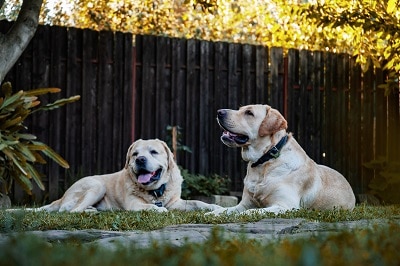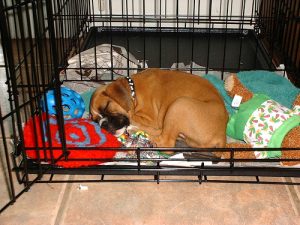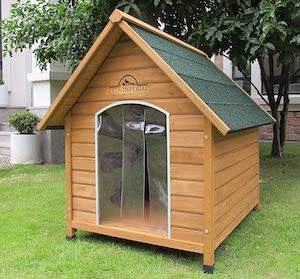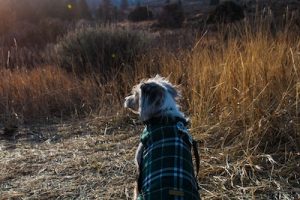In the UK, it’s common for dog parents to consider letting their dogs sleep outside. Don’t think you’re the meanest dog owner just yet.
While some dogs may enjoy the great outdoors, you must consider the climate in your specific geographical area and if it’s safe for dogs to sleep outside. The decision of where a dog should sleep is personal. It can depend on various factors, including breed, age, health, and lifestyle.
As responsible pet owners, we must ensure our furry friend’s comfort, health and safety, whether they’re sleeping inside or outside.
Generally, dogs can sleep outside in the UK. However, temperatures under 5°C or above 20°C can be uncomfortable or dangerous for dogs. You must provide them with a safe, healthy, comfortable/cosy shelter (kennel) if your dogs sleep outside the house.
What to consider before letting your dog sleep outside?
1. Age, Breed, and Size of Your Dog
The age, breed, and size of your dog will play a significant role in determining its capability to sleep in an outside environment.
Puppies and senior dogs are typically not well-equipped to withstand the harsh UK climate and should never be left to sleep outside.
Smaller dog breeds, such as Chihuahuas, Pomeranians, and Yorkshire Terriers, also have more difficulty regulating their body temperature and can easily get chilled.
Larger breeds, on the other hand, such as Great Danes, Saint Bernards, and Newfoundlands, are better equipped to handle the UK weather but still require proper bedding and shelter.
2. Health Conditions and Temperament
Dogs with medical conditions, such as arthritis or skin problems, may struggle to sleep outside, mainly if the weather is harsh.
Additionally, dogs with timid or nervous temperaments may be unable to handle the stress and noise of sleeping outside, even if they are physically capable.
3. Availability of Indoor Space
Indoor space availability is another essential factor that most dog owners need to remember to consider.
Having your dog sleep inside may not be practical or feasible if you live in a small apartment. However, if you have a spacious home with room for your dog to sleep inside, it may be better to keep them inside.
Why would sleeping outside not be safe for dogs?
Now that we know our dogs CAN sleep outside. We must ponder over whether they should. There are many things to consider when debating the challenges of outdoor sleeping for dogs that we’ll separate and discuss here.
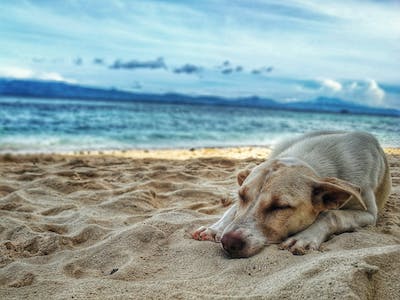
1. Weather and Climate
In the UK, the weather can vary greatly, with different regions experiencing different temperatures and conditions throughout the year.
The most common weather patterns in the UK include rain, wind, and cold temperatures, with occasional bouts of hot and humid weather. These weather patterns can significantly impact dogs and their overall well-being.
Extreme weather conditions such as prolonged periods of rain, strong winds, and low temperatures can pose significant challenges for dogs. For example, extended exposure to rain and wind can lead to hypothermia. Moreover, too much cold can also cause discomfort and weaken their immune system.
To ensure your dog is safe and comfortable, give them access to a dry and sheltered area. It’s especially important during extreme weather conditions such as heavy rain, snow, or high winds. The shelter should be well-insulated and large enough for the dog to move around comfortably, with a door that can be closed.
The shelter’s floor should be elevated and covered with a waterproof material to prevent moisture from seeping in. Providing adequate bedding to keep your doggo warm and comfortable is also important.
And most important of all, monitor your mutt closely during rough weather and bring them inside if they show discomfort or distress.
Read More: Should you walk your dog in cold weather?
2. Parasites
Dog-loving parasites such as worms live mostly outdoors. Your dog will be accessible to these nasties, especially if their sleeping area is not waterproof and enclosed.
Many of these can live in the grass and plants and will love being able to latch on to a warm dog. You should be strict with the worming and flea treatment to combat this.
3. Anxiety
Remember that dogs, like humans, are social animals first and foremost. They get anxious under pressing situations such as being alone, cold and hungry in the dark.
As a responsible owner, you need to consider these things before getting them to sleep outside. Putting them outside when they may hate it can make their mental health suffer to the point where it’s unsafe.
Separation anxiety is another condition to consider. If your furry friend struggles alone in the house, leaving them outside could worsen matters.
4. Effects of boredom
If your dog isn’t left in the company of another dog or with stimulation such as toys and games, it could become depressed and destructive. Who knows what damage they will cause to the environment and themselves?
Dogs are known to sniff about and explore their boundaries. If they find a way out, they may take it and get lost.
5. Food and Water
Your doggo should always have access to food and water. More importantly, they should be the only party with accessibility, so their food and water supply don’t get contaminated.
Bugs flying and eating their food or drowning in the water could be ingested. Wild animals could also be attracted to it, posing a genuine threat to your dog.
6. Other Animals
Your dog’s outdoor area should be safe and secure so no one can get in or out. Male dogs smelling bitches in the area can drive their instincts to mate wild. Alternatively, a bitch of heat can attract the attention of other dogs nearby.
Your doggo is also at risk from wild animals. Foxes, badgers, and other wild animals can threaten dogs, especially if they aren’t properly secured. It is important to ensure that your dog’s bedding and shelter are in a secure area and that it is protected from wild animals.
Read More: Do dogs feel cold? How do you know if your doggo is cold?
Alternatives to Dog Sleeping Outside: Indoor Bed
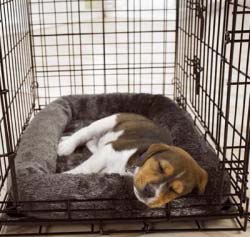
One of the best alternatives to outdoor sleeping for dogs is to provide a comfortable bed or kennel inside the home.
Dogs are social animals and love to be near their owners, so giving them a space to sleep in can provide a sense of security and comfort. For various reasons, an indoor bed or kennel is especially important for dogs who can’t sleep outside.
There are a variety of beds and kennels available for dogs in the UK, from plush and cushioned to simple and functional.
When choosing a bed or kennel for your dog, consider their size, breed, and individual preferences. Some dogs like to nest and burrow, while others prefer a raised surface for their head. There are also orthopaedic beds designed for dogs with joint pain or arthritis.
Frequently Asked Questions (FAQs)
1. What temperature is OK for dogs to sleep outside in the UK?
In the UK, a temperature between 5°C to 20°C is considered safe for most healthy dogs to sleep outside. However, small breeds, senior, and unhealthy dogs may feel cold even in these temperatures, so they may need to be brought indoors.
2. Can dogs sleep outside in a kennel?
Dogs can sleep outside in a kennel as long as it is secure, comfortable, and provides protection from extreme weather conditions. Additionally, the kennel should be properly ventilated and insulated to protect the doggo from contaminations.
3. Which dog breeds are suitable for sleeping outside?
Generally, dog breeds that have a thicker coat or were originally bred for outdoor work may be better suited for sleeping outside in moderate weather conditions. However, it’s recommended that all dogs have access to shelter and a comfortable place to sleep, regardless of breed.
Common pet dog breeds in the UK that are suitable for outdoor sleeping include:
- Labrador Retriever
- Golden Retriever
- Cocker Spaniel
- Border Collie
- Jack Russell Terrier
- Siberian Husky
- Alaskan Malamute
4. Which dog breeds aren’t suitable for sleeping outside?
- Small toy and companion dog breeds such as Chihuahuas, Pomeranians, and Yorkshire Terriers are not suitable for sleeping outside in the UK climate as they have less insulation to protect them from the elements.
- Dogs with health conditions, such as arthritis or a weak immune system, should also not sleep outside.
- Additionally, dogs with short snouts, like Pugs and Bulldogs, may have a harder time regulating their body temperature, making it unsuitable for them to sleep outside.
It’s always best to consult a veterinarian to determine if your specific dog can tolerate sleeping outside.
5. How to ensure a safe and secure outdoor sleeping space for my dog?
1. Provide a sturdy, weather-proof kennel or dog house.
2. Place the kennel in a sheltered location.
3. Install insulation to maintain a comfortable temperature.
4. Use a raised, comfortable bedding material.
5. Make sure the space is well-ventilated.
6. Keep the area clean and free of debris.
7. Consider installing a heat lamp or heating pad in cold weather.
8. Provide protection from wild animals by installing a secure fence.
